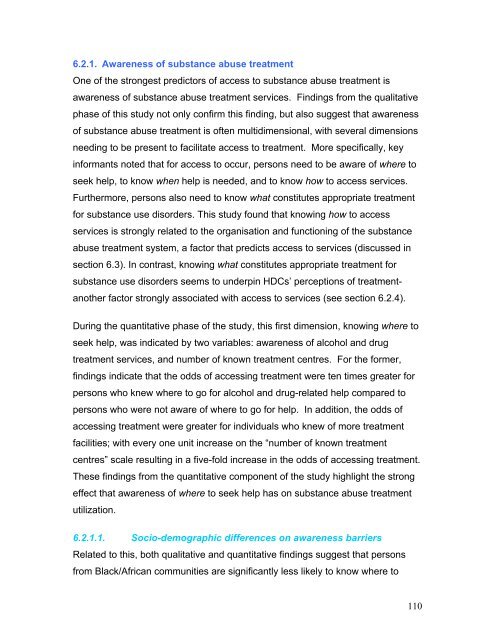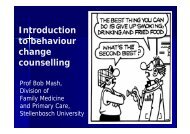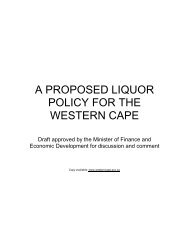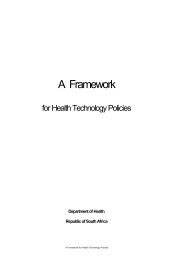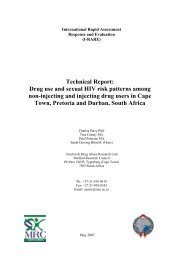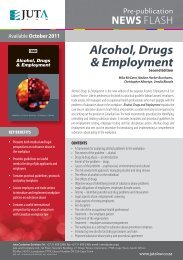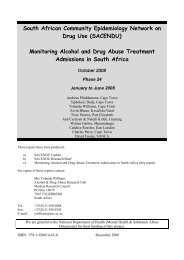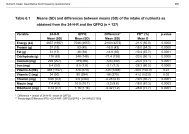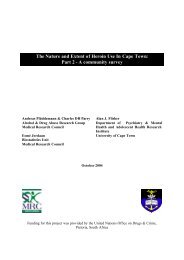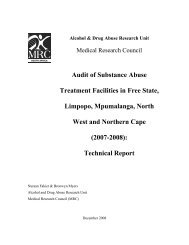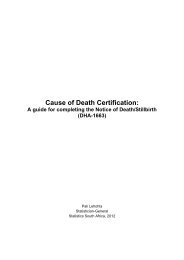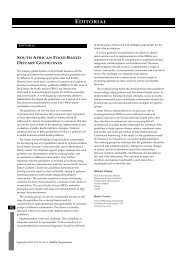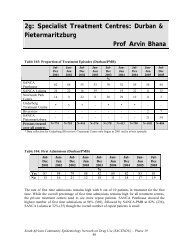Access to substance abuse treatment in the Cape Town metropole ...
Access to substance abuse treatment in the Cape Town metropole ...
Access to substance abuse treatment in the Cape Town metropole ...
Create successful ePaper yourself
Turn your PDF publications into a flip-book with our unique Google optimized e-Paper software.
6.2.1. Awareness of <strong>substance</strong> <strong>abuse</strong> <strong>treatment</strong>One of <strong>the</strong> strongest predic<strong>to</strong>rs of access <strong>to</strong> <strong>substance</strong> <strong>abuse</strong> <strong>treatment</strong> isawareness of <strong>substance</strong> <strong>abuse</strong> <strong>treatment</strong> services. F<strong>in</strong>d<strong>in</strong>gs from <strong>the</strong> qualitativephase of this study not only confirm this f<strong>in</strong>d<strong>in</strong>g, but also suggest that awarenessof <strong>substance</strong> <strong>abuse</strong> <strong>treatment</strong> is often multidimensional, with several dimensionsneed<strong>in</strong>g <strong>to</strong> be present <strong>to</strong> facilitate access <strong>to</strong> <strong>treatment</strong>. More specifically, key<strong>in</strong>formants noted that for access <strong>to</strong> occur, persons need <strong>to</strong> be aware of where <strong>to</strong>seek help, <strong>to</strong> know when help is needed, and <strong>to</strong> know how <strong>to</strong> access services.Fur<strong>the</strong>rmore, persons also need <strong>to</strong> know what constitutes appropriate <strong>treatment</strong>for <strong>substance</strong> use disorders. This study found that know<strong>in</strong>g how <strong>to</strong> accessservices is strongly related <strong>to</strong> <strong>the</strong> organisation and function<strong>in</strong>g of <strong>the</strong> <strong>substance</strong><strong>abuse</strong> <strong>treatment</strong> system, a fac<strong>to</strong>r that predicts access <strong>to</strong> services (discussed <strong>in</strong>section 6.3). In contrast, know<strong>in</strong>g what constitutes appropriate <strong>treatment</strong> for<strong>substance</strong> use disorders seems <strong>to</strong> underp<strong>in</strong> HDCs’ perceptions of <strong>treatment</strong>ano<strong>the</strong>rfac<strong>to</strong>r strongly associated with access <strong>to</strong> services (see section 6.2.4).Dur<strong>in</strong>g <strong>the</strong> quantitative phase of <strong>the</strong> study, this first dimension, know<strong>in</strong>g where <strong>to</strong>seek help, was <strong>in</strong>dicated by two variables: awareness of alcohol and drug<strong>treatment</strong> services, and number of known <strong>treatment</strong> centres. For <strong>the</strong> former,f<strong>in</strong>d<strong>in</strong>gs <strong>in</strong>dicate that <strong>the</strong> odds of access<strong>in</strong>g <strong>treatment</strong> were ten times greater forpersons who knew where <strong>to</strong> go for alcohol and drug-related help compared <strong>to</strong>persons who were not aware of where <strong>to</strong> go for help. In addition, <strong>the</strong> odds ofaccess<strong>in</strong>g <strong>treatment</strong> were greater for <strong>in</strong>dividuals who knew of more <strong>treatment</strong>facilities; with every one unit <strong>in</strong>crease on <strong>the</strong> “number of known <strong>treatment</strong>centres” scale result<strong>in</strong>g <strong>in</strong> a five-fold <strong>in</strong>crease <strong>in</strong> <strong>the</strong> odds of access<strong>in</strong>g <strong>treatment</strong>.These f<strong>in</strong>d<strong>in</strong>gs from <strong>the</strong> quantitative component of <strong>the</strong> study highlight <strong>the</strong> strongeffect that awareness of where <strong>to</strong> seek help has on <strong>substance</strong> <strong>abuse</strong> <strong>treatment</strong>utilization.6.2.1.1. Socio-demographic differences on awareness barriersRelated <strong>to</strong> this, both qualitative and quantitative f<strong>in</strong>d<strong>in</strong>gs suggest that personsfrom Black/African communities are significantly less likely <strong>to</strong> know where <strong>to</strong>110


